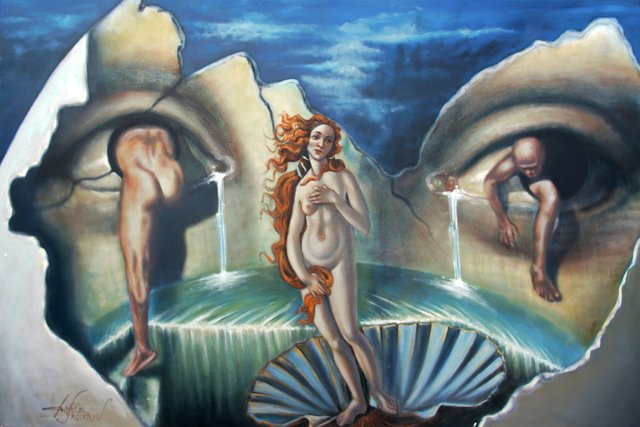Realism is back. Realistic, or representational, art fell out of favor with the advent of photography, but today's painters and sculptors are reviving old techniques and giving reality a whole new spin.
Charles Sabourin Artwork Title: Life and death. Contemporary artist Contemporary Painter, Artist from Athelstan Canada#Metarealism
Art in the Metarealism tradition doesn't look real. Although there might be recognizable images, the scenes depict alternate realities, alien worlds, or spiritual dimensions.
Metarealism evolved from the work of early 20th century painters who believed that art could explore existence beyond human consciousness. Italian painter and writer Giorgio de Chirico (1888–1978) founded Pittura Metafisica (Metaphysical Art), a movement that combined art with philosophy. Metaphysical artists were known for painting faceless figures, eerie lighting, impossible perspective, and stark, dreamlike vistas.
Pittura Metafisica was short-lived, but during the 1920s and 1930s, the movement influenced contemplative paintings by Surrealists and Magic Realists. A half century later, artists began using the abbreviated term Metarealism, or Meta-realism, to describe brooding, enigmatic art with a spiritual, supernatural, or futuristic aura.
Metarealism is not a formal movement, and the distinction between Metarealism and Surrealism is nebulous. Surrealists aspire to capture the subconscious mind—the fragmented memories and impulses that lie below the level of consciousness. Metarealists are interested in the superconscious mind—a higher level of awareness that perceives many dimensions. Surrealists describe absurdity, while Metarealists describe their vision of possible realities.
Artists Kay Sage (1898–1963) and Yves Tanguy (1900-1955) are usually described as Surrealists, but the scenes they painted have the eerie, other-worldly aura of Metarealism. For 21st century examples of Metarealism, explore the work of Victor Bregeda, Joe Joubert, and Naoto Hattori.
Expanding computer technologies have given a new generation of artists enhanced ways to represent visionary ideas. Digital painting, digital collage, photo manipulation, animation, 3D rendering, and other digital art forms lend themselves to Metarealism. Digital artists often use these computer tools to create hyper-real images for posters, advertisements, book covers, and magazine illustrations.
Read, Learn and Fun. #dikkatimicekti

Hi! I am a robot. I just upvoted you! I found similar content that readers might be interested in:
https://www.thoughtco.com/realistic-styles-modern-art-4148445